DIGITAL SAT MATH PROBLEMS AND SOLUTIONS
(Part - 34)
Subscribe to our ▶️ YouTube channel 🔴 for the latest videos, updates, and tips.
Problem 1 :

Human blood can be
classified into four common blood types—A, B, AB, and O. It is also
characterized by the presence (+) or absence (–) of the rhesus factor. The
table above shows the distribution of blood type and rhesus factor for a group
of people. If one of these people who is rhesus negative (–) is chosen at
random, the probability that the person has blood type B is 1/9. What is the
value of x?
Solution :

Problem 2 :
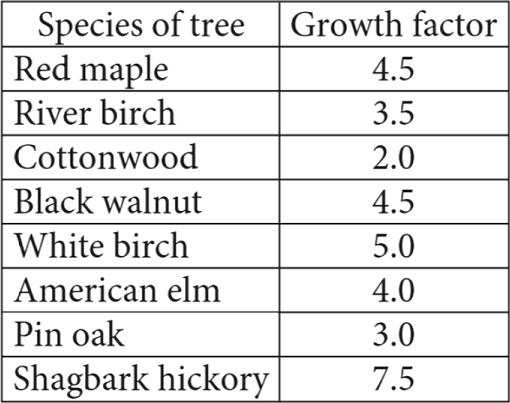
One method of calculating the approximate age, in years, of a tree of a particular species is to multiply the diameter of the tree, in inches, by a constant called the growth factor for that species. The table above gives the growth factors for eight species of trees. If a white birch tree and a pin oak tree each now have a diameter of 1 foot, which of the following will be closest to the difference,in inches,of their diameters 10 years from now?(1 foot = 12 inches)
A) 1.0
B) 1.2
C) 1.3
D) 1.4
Solution :

Problem 3 :
The scatterplot below shows the amount of electric energy generated, in millions of megawatt-hours, by nuclear sources over a 10-year period.
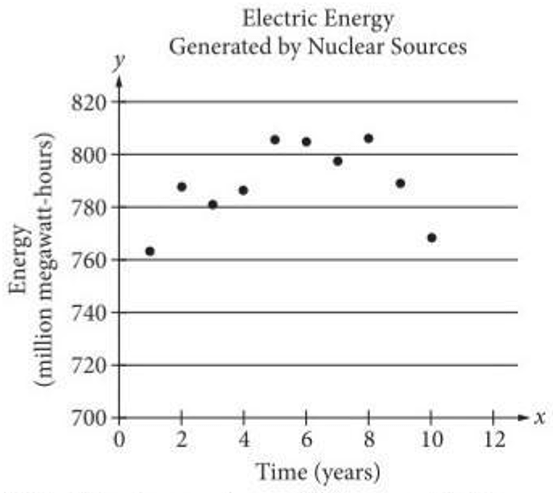
Of the following
equations, which best models the data in the scatterplot?
A) y = 1.674x2 + 19.76x – 745.73
B) y = -1.674x2 - 19.76x – 745.73
C) y = 1.674x2 + 19.76x + 745.73
D) y = -1.674x2 + 19.76x + 745.73
Solution :

Problem 4 :
y < 6x + 2
For which of the following tables are all the values of x and their corresponding values of y solutions to the given inequality?
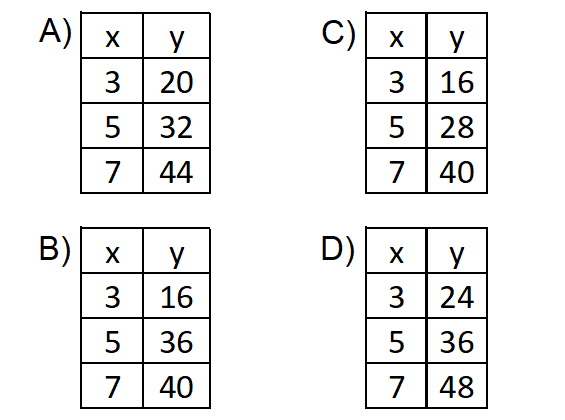
Solution :

Problem 5 :
A psychologist set up an experiment to study the tendency of a person to select the first item when presented with a series of items. In the experiment, 300 people were presented with a set of five pictures arranged in random order. Each person was asked to choose the most appealing picture. Of the first 150 participants, 36 chose the first picture in the set. Among the remaining 150 participants, p people chose the first picture in the set. If more than 20% of all participants chose the first picture in the set, which of the following inequalities best describes the possible values of p?
A) p > 0.20(300−36), where p ≤ 150
B) p > 0.20(300+36), where p ≤ 150
C) p – 36 > 0.20(300), where p ≤ 150
D) p + 36 > 0.20(300), where p ≤ 150
Solution :

Problem 6 :
√x/2 + √y = 5
√x - √y/2 = -1/2
If (a, b) is the solution to the system of equations above, what is the value of a?
A) 8/5
B) 9/5
C) 64/25
D) 81/25
Solution :

Problem 7 :
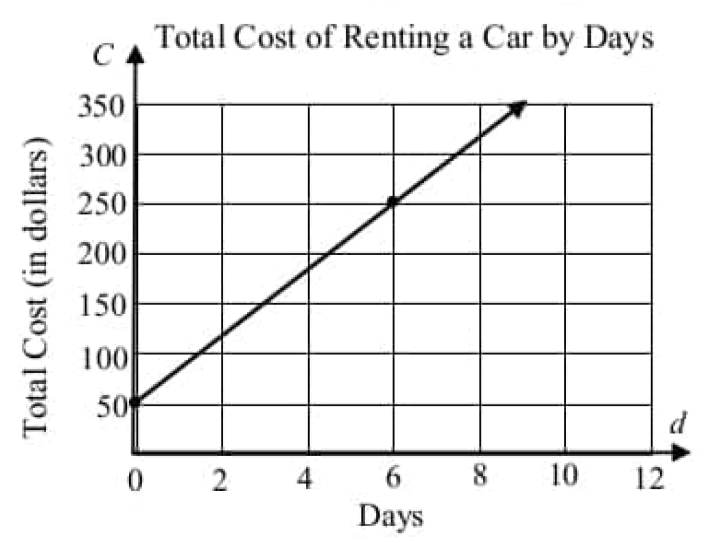
The graph above displays the total cost C, in dollars, of renting a car for d days. If Nigel rents a car for 21 days for his summer trip, what is the total rental cost?
A) $600
B) $650
C) $700
D) $750
Solution :

Problem 8 :
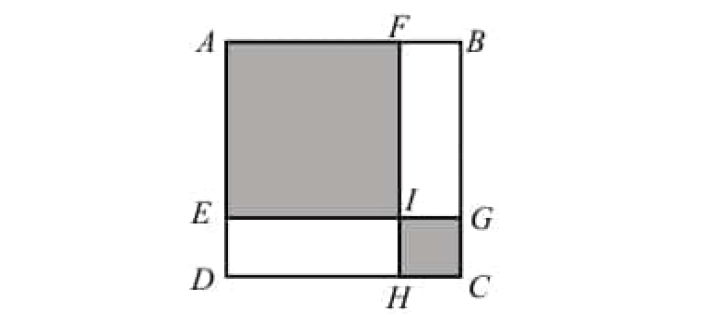
In the figure above, the area of square AFIE is 9 times the area of square HIGC. What percent of square ABCD is shaded?
A) 56.25%
B) 62.5%
C) 67.5%
D) 70.5%
Solution :

Problem 9 :
A survey of 700 randomly selected people aged 15 through 20 in a certain tows was conducted to gather data on how they prefer to see movies. The data are shown in the table below.
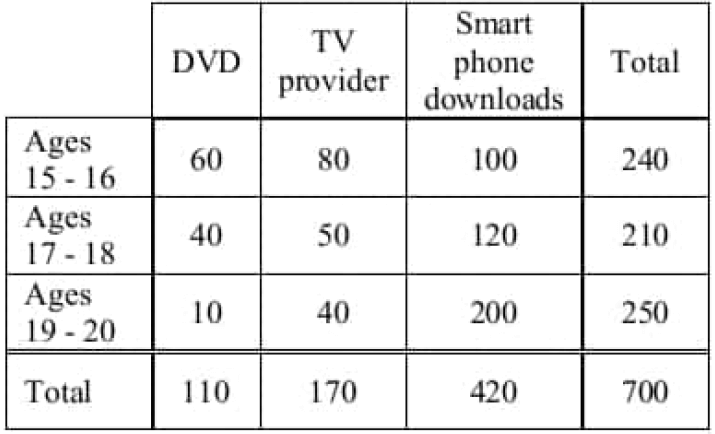
If a person is chosen at random from those under 18 years old, which of the following is closest to the probability that the person preferred smartphone downloads?
A) 0.49
B) 0.52
C) 0.54
D) 0.56
Solution :

Problem 10 :
If the graph of y = x2 is translated up 3 units and right 5 units, what is the equation of the new graph?
A) y = x2 – 3x + 5
B) y = x2 – 6x + 14
C) y = x2 + 10x + 5
D) y = x2 – 10x + 28
Solution :

Problem 11 :
If (x - 1)/3 = k and k = 3, what is the value of x?
A) 2
B) 4
C) 9
D) 10
Solution :

Problem 12 :
On Saturday afternoon, Armand sent m text messages each hour for 5 hours, and Tyrone sent p text messages each hour for 4 hours. Which of the following represents the total number of messages sent by Armand and Tyrone on Saturday afternoon?
A) 9mp
B) 20mp
C) 5m + 4p
D) 4m + 5p
Solution :

Problem 13 :
Kathy is a repair technician for a phone company. Each week, she receives a batch of phones that need repairs. The number of phones that she has left to fix at the end of each day can be estimated with the equation
P = 108 - 23d,
where P is the number of phones left and d is the number of days she has worked that week. What is the meaning of the value 108 in this equation?
A) Kathy will complete the repairs within 108 days.
B) Kathy starts each week with 108 phones to fix.
C) Kathy repairs phones at a rate of 108 per hour.
D) Kathy repairs phones at a rate of 108 per day.
Solution :

Problem 14 :
(x2y - 3y2 + 5xy2) - (-xy2 + 3xy2 - 3y2)
Which of the following is equivalent to the expression above?
A) 4x2y2
B) 8xy2 - 6y2
C) 2x2y + 2xy2
D) 2x2y + 8xy2 -6y2
Solution :

Problem 15 :
Solve for x :
Solution :

Problem 16 :
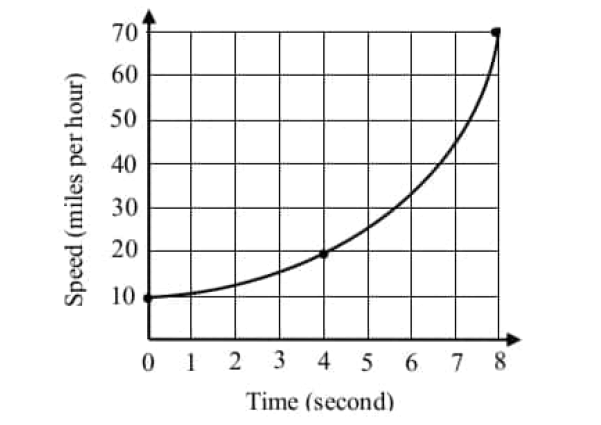
Jackie is driving a car at 10 miles per hour. The graph above shows the speed of his car over 8 seconds. During which of the following time intervals did the speed show the greatest average rate of change?
A) 0 to 2 seconds
B) 2 to 4 seconds
C) 4 to 6 seconds
D) 6 to 8 seconds
Solution :

Problem 17 :
P(x) = x2 + ax + b
In the function above, if the value of P(0) is 1, which of the following must be true?
A) x is a factor of P(x).
B) x – 1 is a factor of P(x).
C) The remainder when P(x) is divided by x – 1 is 0.
D) The remainder when P(x) is divided by x is 1.
Solution :

Problem 18 :
f(x) = 2x2 – 16x + 18
If f(x) = a(x + b)2 + c is equivalent to the function above, what is the value of c for f(x)?
A) –48
B) –14
C) 2
D) 50
Solution :

Problem 19 :
f(x) = (x – 4)2 – 1
f(x) = -¼(x – 4)2 + 4
Two functions f and g are given above. For which of the following values of x does f(x) – g(x) = 0?
A) 1
B) 3
C) 6
D) 8
Solution :

Problem 20 :
x2 + y2 – 4x + 4y = k
The equation of a circle in the xy-plane, where k is a constant, is shown above. If the radius of the circle is 6, what is the value of k?
Solution :

You might like these
Solving the HARDEST SAT Math Questions ONLY using Desmos
Tricky SAT Math Problems Solved Easily
Challenging SAT Math Questions
How to Solve the Hardest SAT Math Problems
Hard SAT Math Questions with Video Solutions
SAT Math Practice Test with Answers
SAT Math Practice Questions with Answers
SAT Math Problems and Solutions
SAT Math Practice Problems with Answers
25 of the Hardest SAT Math Questions
The 15 Hardest SAT Math Questions Ever
The 10 Most Difficult SAT Math Questions
The 10 Hardest SAT Math Questions
10 Tricky SAT Math Questions with Answers
SAT Math Preparation with Hard Questions
SAT Math Practice Hard Questions
SAT Math Practice Problems Hard
The Hidden Patterns in Hard SAT Math Questions
How to Solve Challenging Math Problems in SAT
How to Master the SAT Math Section
Problem Solving Strategies for SAT Math
Conquering the Hardest SAT Math Questions
SAT Math Problems on Exponents and Radicals
Digital SAT Problems and Solutions (Part - 1)
Digital SAT Problems and Solutions (Part - 2)
Digital SAT Problems and Solutions (Part - 3)
Digital SAT Problems and Solutions (Part - 4)
Digital SAT Problems and Solutions (Part - 5)
Digital SAT Problems and Solutions (Part - 6)
Digital SAT Problems and Solutions (Part - 7)
Digital SAT Problems and Solutions (Part - 8)
Digital SAT Problems and Solutions (Part - 9)
Digital SAT Problems and Solutions (Part - 10)
Digital SAT Problems and Solutions (Part - 11)
Digital SAT Problems and Solutions (Part - 12)
Digital SAT Problems and Solutions (Part - 13)
Digital SAT Problems and Solutions (Part - 14)
Digital SAT Problems and Solutions (Part - 15)
Digital SAT Problems and Solutions (Part - 16)
Digital SAT Problems and Solutions (Part - 17)
Digital SAT Problems and Solutions (Part - 18)
Digital SAT Problems and Solutions (Part - 19)
Digital SAT Problems and Solutions (Part - 20)
Digital SAT Problems and Solutions (Part - 21)
Digital SAT Problems and Solutions (Part - 22)
Digital SAT Problems and Solutions (Part - 23)
Digital SAT Problems and Solutions (Part - 24)
Digital SAT Problems and Solutions (Part - 25)
Digital SAT Problems and Solutions (Part - 26)
Digital SAT Problems and Solutions (Part - 27)
Digital SAT Problems and Solutions (Part - 28)
Digital SAT Problems and Solutions (Part - 29)
Digital SAT Problems and Solutions (Part - 30)
Digital SAT Problems and Solutions (Part - 31)
Digital SAT Problems and Solutions (Part - 32)
Digital SAT Problems and Solutions (Part - 33)
Digital SAT Problems and Solutions (Part - 34)
Digital SAT Problems and Solutions (Part - 35)
Digital SAT Problems and Solutions (Part - 36)
Digital SAT Problems and Solutions (Part - 37)
Digital SAT Problems and Solutions (Part - 38)
Digital SAT Problems and Solutions (Part - 39)
Digital SAT Problems and Solutions (Part - 40)
Digital SAT Problems and Solutions (Part - 41)
Digital SAT Problems and Solutions (Part - 42)
Digital SAT Problems and Solutions (Part - 43)
Digital SAT Problems and Solutions (Part - 44)
Digital SAT Problems and Solutions (Part - 45)
Digital SAT Problems and Solutions (Part - 46)
Digital SAT Problems and Solutions (Part - 47)
Digital SAT Problems and Solutions (Part - 48)
Digital SAT Problems and Solutions (Part - 49)
Digital SAT Problems and Solutions (Part - 50)
Digital SAT Problems and Solutions (Part - 51)
Digital SAT Problems and Solutions (Part - 52)
Digital SAT Problems and Solutions (Part - 53)
Digital SAT Problems and Solutions (Part - 54)
Digital SAT Problems and Solutions (Part - 55)
Digital SAT Problems and Solutions (Part - 56)
Digital SAT Problems and Solutions (Part - 57)
Digital SAT Problems and Solutions (Part - 58)
Digital SAT Problems and Solutions (Part - 59)
Digital SAT Problems and Solutions (Part - 60)
Digital SAT Problems and Solutions (Part - 61)
Digital SAT Problems and Solutions (Part - 62)
Digital SAT Problems and Solutions (Part - 63)
Digital SAT Problems and Solutions (Part - 64)
Digital SAT Problems and Solutions (Part - 65)
Digital SAT Problems and Solutions (Part - 66)
Digital SAT Problems and Solutions (Part - 67)
Digital SAT Problems and Solutions (Part - 68)
Digital SAT Problems and Solutions (Part - 69)
Digital SAT Problems and Solutions (Part - 70)
Digital SAT Problems and Solutions (Part - 71)
Digital SAT Problems and Solutions (Part - 72)
Digital SAT Problems and Solutions (Part - 73)
Digital SAT Problems and Solutions (Part - 74)
Digital SAT Problems and Solutions (Part - 75)
Digital SAT Problems and Solutions (Part - 76)
Digital SAT Problems and Solutions (Part - 77)
Digital SAT Problems and Solutions (Part - 78)
Digital SAT Problems and Solutions (Part - 79)
Digital SAT Problems and Solutions (Part - 80)
Digital SAT Problems and Solutions (Part - 81)
Digital SAT Problems and Solutions (Part - 82)
Digital SAT Problems and Solutions (Part - 83)
Digital SAT Problems and Solutions (Part - 84)
Digital SAT Problems and Solutions (Part - 85)
Digital SAT Problems and Solutions (Part - 86)
Digital SAT Problems and Solutions (Part - 87)
Digital SAT Problems and Solutions (Part - 88)
Digital SAT Problems and Solutions (Part - 89)
Digital SAT Problems and Solutions (Part - 90)
Digital SAT Problems and Solutions (Part - 91)
Digital SAT Problems and Solutions (Part - 92)
Digital SAT Problems and Solutions (Part - 93)
Digital SAT Problems and Solutions (Part - 94)
Digital SAT Problems and Solutions (Part - 95)
Digital SAT Problems and Solutions (Part - 96)
Digital SAT Problems and Solutions (Part - 97)
Digital SAT Problems and Solutions (Part - 98)
Digital SAT Problems and Solutions (Part - 99)
Digital SAT Problems and Solutions (Part - 100)
Digital SAT Problems and Solutions (Part - 101)
Digital SAT Problems and Solutions (Part - 102)
Digital SAT Problems and Solutions (Part - 103)
Digital SAT Problems and Solutions (Part - 104)
Digital SAT Problems and Solutions (Part - 105)
Digital SAT Problems and Solutions (Part - 106)
Digital SAT Problems and Solutions (Part - 107)
Digital SAT Problems and Solutions (Part - 108)
Digital SAT Problems and Solutions (Part - 109)
Digital SAT Problems and Solutions (Part - 110)
Digital SAT Problems and Solutions (Part - 111)
Digital SAT Problems and Solutions (Part - 112)
Digital SAT Problems and Solutions (Part - 113)
Digital SAT Problems and Solutions (Part - 114)
Digital SAT Problems and Solutions (Part - 115)
Digital SAT Problems and Solutions (Part - 116)
Digital SAT Problems and Solutions (Part - 117)
Digital SAT Problems and Solutions (Part - 118)
Digital SAT Problems and Solutions (Part - 119)
Digital SAT Problems and Solutions (Part - 120)
Digital SAT Problems and Solutions (Part - 121)
Digital SAT Problems and Solutions (Part - 122)
Digital SAT Problems and Solutions (Part - 123)
Digital SAT Problems and Solutions (Part - 124)
Digital SAT Problems and Solutions (Part - 125)
Digital SAT Problems and Solutions (Part - 126)
Digital SAT Problems and Solutions (Part - 127)
Digital SAT Problems and Solutions (Part - 128)
Digital SAT Problems and Solutions (Part - 129)
Digital SAT Problems and Solutions (Part - 130)
Digital SAT Problems and Solutions (Part - 131)
Digital SAT Problems and Solutions (Part - 132)
Digital SAT Problems and Solutions (Part - 133)
Digital SAT Problems and Solutions (Part - 134)
Digital SAT Problems and Solutions (Part - 135)
Digital SAT Problems and Solutions (Part - 136)
Digital SAT Problems and Solutions (Part - 137)
Digital SAT Problems and Solutions (Part - 138)
Digital SAT Problems and Solutions (Part - 139)
Digital SAT Problems and Solutions (Part - 140)
Digital SAT Problems and Solutions (Part - 141)
Digital SAT Problems and Solutions (Part - 142)
Digital SAT Problems and Solutions (Part - 143)
Digital SAT Problems and Solutions (Part - 144)
Digital SAT Problems and Solutions (Part - 145)
Digital SAT Problems and Solutions (Part - 146)
Digital SAT Problems and Solutions (Part - 147)
Digital SAT Problems and Solutions (Part - 148)
Digital SAT Problems and Solutions (Part - 149)
Digital SAT Problems and Solutions (Part - 150)
Digital SAT Problems and Solutions (Part - 151)
Digital SAT Problems and Solutions (Part - 152)
Digital SAT Problems and Solutions (Part - 153)
Digital SAT Problems and Solutions (Part - 154)
Digital SAT Problems and Solutions (Part - 155)
Digital SAT Problems and Solutions (Part - 156)
Digital SAT Problems and Solutions (Part - 157)
Digital SAT Problems and Solutions (Part - 158)
Digital SAT Problems and Solutions (Part - 159)
Digital SAT Problems and Solutions (Part - 160)
Digital SAT Problems and Solutions (Part - 161)
Digital SAT Problems and Solutions (Part - 162)
Digital SAT Problems and Solutions (Part - 163)
Subscribe to our ▶️ YouTube channel 🔴 for the latest videos, updates, and tips.
Kindly mail your feedback to v4formath@gmail.com
We always appreciate your feedback.
About Us | Contact Us | Privacy Policy
©All rights reserved. onlinemath4all.com

Recent Articles
-
Digital SAT Math Problems and Solutions (Part 44)
Mar 05, 26 03:45 AM
Digital SAT Math Problems and Solutions (Part 44) -
Digital SAT Math Problems and Solutions (Part - 43)
Mar 04, 26 07:20 PM
Digital SAT Math Problems and Solutions (Part - 43) -
Digital SAT Math Problems and Solutions (Part - 42)
Mar 04, 26 06:21 PM
Digital SAT Math Problems and Solutions (Part - 42)


